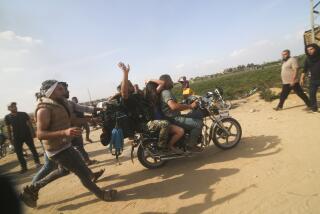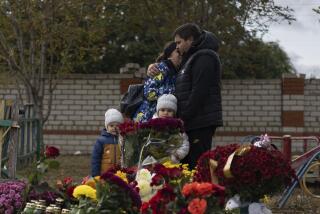Panel calls Marines’ action illegal
- Share via
KABUL, AFGHANISTAN — An Afghan human rights group said Saturday that U.S. Marines acted illegally last month when they fired on scores of civilian vehicles on a busy highway after their convoy was attacked with a car bomb.
Twelve Afghan civilians were killed and dozens injured in the March 4 shootings outside the eastern city of Jalalabad. The incident sparked outrage among Afghans and put new pressure on the government of President Hamid Karzai, which repeatedly has appealed to Western forces to be more mindful of civilian safety.
The report by the Afghanistan Independent Human Rights Commission follows a weeks-long investigation by the group, which says it interviewed about 50 witnesses, local authorities and hospital officials. The findings come as the U.S. military weighs whether criminal charges should be brought against the Marines involved.
The incident began when a suicide bomber rammed an explosives-filled van into the Marines’ convoy. After the attack, the convoy raced away, firing at pedestrians and vehicles along a 10-mile stretch of the road, the main highway between Kabul, the capital, and Jalalabad.
The U.S. military said at the time that the Marines had come under fire as they fled the bombing. But witnesses said no one appeared to be shooting at the troops and that reckless gunfire was directed at civilians miles from the scene of the attack.
There were no Marine casualties in the bombing. The dead and injured civilians included a number of women, children and elderly, Afghan officials said.
“In failing to distinguish between civilians and legitimate military targets, the [Marines] employed indiscriminate force,” the report said. “Their actions thus constitute a serious violation of international humanitarian law.”
The human rights group also alleged that American troops removed spent ammunition casings and other evidence from the scene soon after the shootings, which hampered Afghan authorities’ efforts to reconstruct the sequence of events.
The U.S. military’s initial investigation concluded that the Marines, members of a Special Forces unit based at Camp Lejeune, N.C., had used excessive force in responding to the attack on their convoy.
Their 120-member unit, which had arrived in Afghanistan only in January, was ordered out of the country shortly after the shootings, and the Naval Criminal Investigative Service is conducting a separate inquiry.
The fallout over the Jalalabad shootings comes amid a stepped-up campaign by coalition and Afghan forces against Taliban militants. The insurgents have been striking back with nonconventional attacks such as suicide bombings and roadside explosive devices.
On Saturday, a suicide bomber blew himself up outside a police station in eastern Khowst province, killing at least eight people and injuring six. The Taliban claimed responsibility.
The fighting between insurgents and troops of the North Atlantic Treaty Organization is concentrated in the south. At least 70 Taliban have been killed in battles over the last several days, U.S. military officials said, and 12 coalition troops have been killed in the last week.
New fighting broke out Saturday in southern Helmand province when insurgents fired rocket-propelled grenades at coalition and Afghan troops. The U.S. military said six militants were killed in a subsequent airstrike.
Meanwhile, insurgents posted a video on the Internet showing two kidnapped French aid workers and their three Afghan associates, who disappeared this month. In the video, the captives plead with the French government to meet their captors’ demands.
Many fear that abductions will become more frequent after last month’s kidnapping of an Italian journalist in Helmand province. The Karzai government, at the behest of Italian officials, released five Taliban prisoners to win his freedom -- a deal that drew sharp criticism from other Western governments.
The kidnappers killed the journalist’s Afghan driver and interpreter when the Afghan government balked at freeing more prisoners, prompting claims of a double standard in efforts to win the freedom of Western and Afghan abductees.
Karzai has said no more prisoners will be freed in exchange for hostages.
Special correspondent Saidi reported from Kabul and Times staff writer King from Istanbul.
More to Read
Sign up for Essential California
The most important California stories and recommendations in your inbox every morning.
You may occasionally receive promotional content from the Los Angeles Times.









